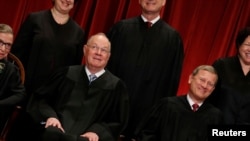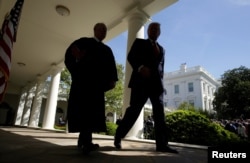The retirement of Justice Anthony Kennedy, the key swing vote on the U.S. Supreme Court, gives President Donald Trump a coveted opportunity make the second high court appointment of his term and sets the stage for one of the most consequential confirmation battles in decades.
During his 30 years on the bench, Kennedy, an 81-year- old Republican appointee, has often broken ranks with his conservative colleagues to cast the decisive vote in a string of landmark cases, including those involving abortion, gay rights and voting rights.
His retirement becomes effective at the end of July and a conservative pick by Trump would further strgenthen the court’s conservative wing which often had to contend with Kennedy’s penchant for moderation and maverick opinions.
While conservatives see a rare opening for another right-leaning high court appointment, liberals are vowing to block it, fearing a conservative-dominated court could reverse decades of gains on abortion, gay rights and other issues of import to them.
Abortion ruling
Kennedy has been at the center of many of the court’s most contentious cases of the past several decades. In 1992, he co-authored a ruling that reaffirmed women's constitutional right to abortion, and in 2015 he wrote a landmark decision that legalized same-sex marriage in the United States. In other major cases, however, such as the recent ruling on the Trump administration’s travel ban, he’s furnished the critical fifth vote for conservative positions.
Sarah Warbelow, legal director with the Human Rights Campaign, a Washington-based LGBTQ advocacy organization, said Kennedy “was really the architect behind some of the most critical decisions impacting our lives.”
President Trump has called Kennedy a man of “tremendous vision” and said he’d "immediately" begin the search for a replacement.
"We have to pick one that’s going to be there for 40 years, 45 years, we need intellect, we need so many things. So many elements go into picking a Supreme Court justice," he said at a rally in North Dakota Wednesday.
To be confirmed, Supreme Court nominees used to require a minimum of 60 votes in the Senate. But last year Republicans who control the Senate changed the rules, allowing a nominee to be confirmed by a simple majority of 51.
Gorsuch nomination
Trump’s first Supreme Court nominee, Neil Gorsuch, won confirmation by a 54-46 vote. His appointment reinstated the court’s 5-4 conservative majority, leading to a string of favorable rulings for the Trump administration.
Democrats fear that Trump may try to force a nomination through the Senate before the November Congressional election, which could decide which party gets to control the Senate and the House of Representatives.
Senate Minority Leader Chuck Schumer, reminding Republicans of their refusal to hold a vote in 2016 for then President Barack Obama's nominee, Merrick Garland, urged them on Tuesday not to consider Trump’s next Supreme Court pick before the elections.
“Millions of people are just months away from determining the senators who should vote to confirm or reject the president’s nominee, and their voices deserve to be heard now, as Leader (Mitch) McConnell thought they deserved to be heard then. Anything but that would be the absolute height of hypocrisy,” Schumer said in a statement.
Deciding vote
In recent years, the Supreme Court has decided about 20 percent of cases by a 5-4 vote, with the outcome often turning on Justice Kennedy's vote, according to Charles Geyh, a professor at the Indiana University Maurer School of Law.
Justice Kennedy "was at the center of many of those and many of those are among the most important decisions that the Supreme Court has made," Geyh, who is an expert on judicial selection, said.
Paul Schiff Berman, a law professor at the George Washington University, said that whether Kennedy will be known for his decisions on abortion and gay marriage “depend in large part on whether those two precedents actually survive in the years to come and I think that's an open question.
But Geyh said that Chief Justice Roberts is likely to temper any hasty reversals of precedents out of concern about the court's reputation.
"Roberts is concerned about the legacy of the court, he’s concerned about a court that is perceived as upholding the court of law, and he’s concerned about a public perception that court is just a group of politicians in robes," Geyh said.





